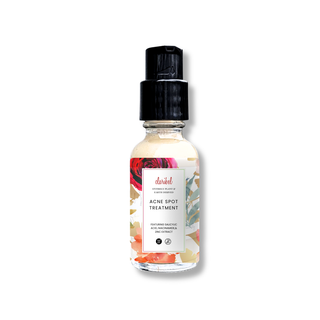
Vegan Skin Care ৹ Hyaluronic and Collagen the Power Duo
Vegan skin care products with hyaluronic acid and collagen have become a very popular strategy for anti aging skin care, and with good reason.
Our bodies start losing collagen at the time we reach our mid-20s. Women's collagen production drops by up to 30% during the first five years of menopause. This explains why many people notice their skin losing elasticity and firmness as they age.
Your skin needs both hyaluronic acid and collagen to stay youthful. Hyaluronic acid's moisture-retaining abilities are remarkable - just a quarter-teaspoon can hold about one and a half gallons of water.
Studies reveal that applying hyaluronic acid to your skin can boost hydration by up to 96% after eight weeks of regular use.
In this blog post, you'll learn about their vital role in modern skin care routines. We'll also share reasons why vegan skin care is better than conventional products.
Our Wrinkle Repair & Peptide Complex Cream is a great way to bring hyaluronic acid and collagen together in one product, and ships for free in the US.
Understanding Skin Aging and the Role of Collagen
Your skin starts aging much earlier than you might think. The aging process happens in two different ways that work together at the same time.
What causes skin to age?
Your skin ages from both internal (chronological) and external (environmental) factors. Internal aging is a natural process coded in your genes that happens whatever external factors affect you. This process can't be stopped and involves hormone changes. Your body's sex hormone production starts dropping in your mid-twenties.
External aging comes from environmental exposure. UV radiation leads to 90% of the visible changes in your skin. This "photoaging" harms skin cells and breaks down collagen faster. Here are other things that speed up aging:
- Smoking damages your collagen and elastin
- Too much sugar weakens collagen fibers
- Pollution in the environment
- Long-term stress reduces hyaluronan synthase and collagen
- Bad sleep quality

How collagen and hyaluronic acid decline over time
Collagen makes up 30% of your body's protein and gives your skin structure and support. This vital protein starts decreasing around age 25. Production drops about 1% each year until menopause. Women's collagen levels drop by 30% during the first five years of menopause. After that, it continues to decrease by 2% every year.
Hyaluronic acid is significant to keep your skin hydrated, and it decreases as you age. By age 50, you have half the HA you started with. The average HA concentration drops from 0.3 mg/g of wet tissue in people aged 19-47 to just 0.07 mg/g in those who are 75.
Why moisture and elasticity matter
Your skin's youthful appearance depends on moisture and elasticity. Hydration helps keep your skin elastic. The stratum corneum (your skin's outer layer) stops water from escaping. Good hydration makes this barrier stronger and improves elasticity.
Dry skin shows signs of aging more easily through wrinkles and fine lines. Skin without enough water becomes tight and dull. It also can't repair itself as well. A weak barrier lets irritants get in more easily, which makes existing skin problems worse.
Elasticity mostly depends on collagen and elastin proteins. Collagen provides structure and strength. Elastin helps your skin bounce back after it stretches. As these proteins decrease, your skin becomes less supple and more wrinkled. That's why many people turn to vegan skin care products with hyaluronic acid and collagen.
How Hyaluronic and Collagen Work in the Body
Collagen and hyaluronic acid work as the foundations of our bodies at the molecular level to keep skin healthy and joints functioning well. Let's get into their specific roles and how they work together.
Collagen's structural role in skin and joints
Your body relies on collagen as its main support protein, which makes up 30% of your total protein content. This remarkable protein gives structure, strength, and support to your skin, muscles, bones, and connective tissues. Type I collagen represents 90% of your body's collagen and builds a dense network in the dermis.
Collagen's benefits extend beyond skin support. Type II collagen creates elastic cartilage that protects your joints and prevents friction between bones while keeping you mobile. Your body also employs collagen to attract new skin cells to damaged areas during healing.
Hyaluronic acid's water-retention properties
Hyaluronic acid (HA) has an incredible ability to retain moisture. This unique molecule holds up to 1000 times its weight in water, which makes it nature's best humectant. Your body's connective tissues naturally contain HA, which keeps the skin's intercellular matrix hydrated.
HA controls water balance, osmotic pressure, and ion flow in the dermis. A viscoelastic film forms on your skin's surface that captures moisturizing compounds and releases nutrients steadily. HA molecules prefer to bond with water instead of themselves, which shows their strong water affinity.
Synergistic effects when used together
Research shows collagen and hyaluronic acid create powerful cooperative effects beyond their individual benefits. These compounds act as a "power-healing couple" in tissue regeneration, and studies confirm they work together to reduce inflammation.
Hyaluronic acid and collagen complement each other perfectly. HA adds moisture to make skin plumper and smooth wrinkles, while collagen provides the structure to maintain this fullness. Clinical studies show their combination boosts the activity of proteins that rebuild the extracellular matrix.
All but one of these studies suggest their combination works better than using either compound alone for tissue repair and joint health. A single study found no extra benefit from adding HA to collagen for certain skin measurements.
Our Wrinkle Repair & Peptide Complex Cream is a great way to bring hyaluronic acid and collagen together in one product, and ships for free in the US.
The Environmental Impact of Choosing Vegan Skin Care Products
When you opt for vegan skin care, you're not just making a choice for your skin – you're also making a positive impact on the environment. The production of vegan skin care products generally has a lower environmental footprint compared to traditional skin care for several reasons.
Firstly, plant-based ingredients typically require fewer resources to produce than animal-derived ingredients. This can lead to reduced water consumption, lower greenhouse gas emissions, and less land use. For example, the production of plant-based oils like coconut or sunflower seed oil generally has a smaller environmental impact than the production of animal-derived ingredients like lanolin or beeswax.
Secondly, as a vegan skin care brand and like others, we prioritize sustainable sourcing practices. This can include supporting organically farmed ingredients, using renewable energy in production processes, and implementing fair trade practices. These initiatives contribute to biodiversity conservation, soil health, and social sustainability in ingredient-producing communities.
Lastly, the packaging choices made by vegan skin care brands such as ours, often reflect a commitment to environmental stewardship. We opt for recyclable, biodegradable, or plant based inks and materials wherever possible. By choosing vegan skin care, you're supporting these eco-friendly practices and contributing to a more sustainable beauty industry.
Debunking Myths: Can Vegan Skin Care Really Be Effective?
Despite the growing popularity of vegan skin care, some misconceptions persist about its efficacy. Let's address some common myths and explore the science behind vegan skin benefits:
Myth 1: Vegan skin care isn't as powerful as traditional skin care Reality: Many plant-based ingredients are scientifically proven to be highly effective. For example, bakuchiol, a vegan alternative to retinol, has been shown in studies to improve fine lines and wrinkles with similar efficacy to retinol but with less irritation.
Myth 2: Vegan products can't provide enough hydration Reality: Plant-based oils and butters, such as coconut oil, shea butter, and hyaluronic acid (which can be derived from plant sources), are excellent moisturizers that can deeply hydrate the skin.
Myth 3: Vegan skin care isn't suitable for all skin types Reality: The diverse range of plant-based ingredients means that vegan skin care can be formulated to suit all skin types, from oily and acne-prone to dry and sensitive.
Myth 4: Vegan products have a shorter shelf life Reality: While it's true that some natural preservatives may not be as long-lasting as synthetic ones, many vegan brands use effective plant-based preservatives or innovative packaging to ensure product stability and longevity.
Myth 5: Vegan skin care can't address advanced skin concerns Reality: Advanced vegan formulations can target complex skin issues. For instance, plant stem cells and peptides derived from rice or soy can offer potent anti-aging benefits.
By understanding the science behind vegan ingredients and formulations, it becomes clear that vegan skin care can indeed be highly effective. The key lies in choosing well-formulated products that harness the power of plant-based ingredients to deliver real results for your skin.
Our Wrinkle Repair & Peptide Complex Cream is a great way to bring hyaluronic acid and collagen together in one product, and ships for free in the US:
Conclusion: Embracing Vegan Skin Care with Hyaluronic and Collagen
This piece explores the science behind vegan hyaluronic acid and collagen products that are more than just skin care trends. Without doubt, these compounds naturally decline from our mid-20s and speed up during menopause, which explains many aging signs we see. Both ingredients play vital roles - collagen gives structural support to skin and joints, while hyaluronic acid retains moisture remarkably well.
Research shows oral supplements might deliver better results than topical products. Oral supplements work throughout the body and support natural collagen synthesis instead of just hydrating the surface. Studies prove these ingredients are safe to use long-term, showing minimal side effects even after years of regular use.
Quality vegan alternatives should contain vitamin C, zinc, copper, and silica - nutrients that boost collagen production naturally. On top of that, third-party testing provides great quality assurance. Topical products fit well in complete skin care routines, but science suggests oral supplements target age-related collagen and hyaluronic acid loss better.
Fine lines or mature skin concerns need proper understanding of these ingredients to make smart skin care choices. Vegan hyaluronic acid and collagen products work best with high-quality formulations backed by science. Regular use as part of an integrated approach to skin health brings the best results.





